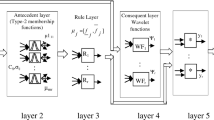Abstract
By utilizing some of the important properties of wavelets like denoising, compression, multiresolution along with the concepts of fuzzy logic and neural network, a new self-constructing fuzzy wavelet neural networks (SCFWNN) using compensatory fuzzy operators are proposed for intelligent fault diagnosis. An on-line learning algorithm is applied to automatically construct the SCFWNN. There are no rules initially in the SCFWNN. They are created and adapted as on-line learning proceeds via simultaneous structure and parameter learning. The advantages of this learning algorithm are that it converges quickly and the obtained fuzzy rules are more precise. The proposed SCFWNN is much more powerful than either the neural network or the fuzzy system since it can incorporate the advantages of both. The results of simulation show that this SCFWNN method has the advantage of faster learning rate and higher diagnosing precision.
Foundation item: Project supported by the National High-Tech. R&D Program for CIMS, China (Grant No. 2003AA414210).
Preview
Unable to display preview. Download preview PDF.
Similar content being viewed by others
References
Zhang, Y.Q., Kandel, A.: Compensatory Genetic Fuzzy Neural Networks And Their Appli-cations. World Scientific, Singapore (1998)
Kosko, B.: Neural Networks and Fuzzy Systems. Prentice-Hall, Englewood Cliffs (1992)
Jang, J.S.R.: ANFIS: Adaptive-network-based fuzzy inference system. IEEE Trans. Systems, Man, and Cybernetics 23, 665–685 (1993)
Carpenter, G.A., Groosberg, S., Markuzon, N., Renold, J.H., Rosen, D.B.: Fuzzy ARTMAP: A neural network architecture for incremental supervised learning of analog multidimen-sional maps. IEEE Trans. On Neural network 3, 698–713 (1992)
Wang, L.X.: Adaptive Fuzzy systems and Control. Prentice-Hall, Englewood Cliffs (1994)
Lin, C., Lee, C.S.G.: Reinforcement structure/parameter learning for neural-network based fuzzy logic control systems. IEEE Transactions on Fuzzy Systems 2, 46–63 (1994)
Ho, D.W.C., Zhang, P.A., Xu, J.: Fuzzy wavelet networks for function learning. IEEE Trans. on Fuzzy Syst. 9, 200–211 (2001)
Javadpour, R., Knapp, G.M.: A fuzzy neural network approach to machine condition monitoring. Computers & Industrial Engineering 45, 323–330 (2003)
Lin, F.J., Lin, C.H., Shen, P.H.: Self-Constructing Fuzzy Neural Network Speed Controller for Permanent-Magnet Synchronous Motor Drive. IEEE Transactions on Fuzzy Systems 9, 751–759 (2001)
Zhang, Y.Q., Kandel, A.: Compensatory Neurofuzzy Systems with Fast Learning Algorithms. IEEE Trans. on Neural Networks 9, 83–105 (1998)
Juang, C.F., Lin, C.T.: An On-Line Self-Constructing Neural Fuzzy Inference Network and Its Applications. IEEE Trans. on Fuzzy Systems 6, 12–31 (1998)
Zhang, Q.: Using wavelet networks in nonparametric estimation. IEEE Trans. Neural Networks 8, 227–236 (1997)
Zhang, Q., Benveniste, A.: Wavelet networks. IEEE Trans. Neural Networks 3, 889–898 (1992)
Zhang, J., Walter, G.G., Lee, W.N.W.: Wavelet neural networks for function learning. IEEE Trans. Signal Processing 43, 1485–1497 (1995)
Pillay, P., Bhattachariee, A.: Application of wavelets to model short-term power system disturbances. IEEE Trans. Power Syst. 11, 2031–2037 (1996)
Guo, Q.J., Yu, H.B., Xu, A.D.: Wavelet Neural Networks for Intelligent Fault Diagnosis. In: The International Symposium on Intelligence Computation & Applications, Wuhan,China, pp. 477–485 (2005)
Lin, C.J., Lin, C.T.: An ART-Based Fuzzy Adaptive Learning Control Network. IEEE Trans. on Fuzzy Systems 5, 477–496 (1997)
Daubechies, I.: The wavelet transform, time–frequency localization, and signal analysis. IEEE Trans. Inform. Theory 36, 961–1005 (1990)
Mallat, S.: A theory for multi-resolution signal decomposition: The wavelet representation. IEEE Trans. Pattern Anal. Machine Intell. 11, 674–693 (1989)
Zimmermann, H.J., Zysno, P.: Latent connective in human decision. Fuzzy Sets and Systems 4, 31–51 (1980)
Guo, Q.J., Yu, H.B., Xu, A.D.: Research and Development on Distributed Condition-Based Maintenance Open System. Computer Integrated Manufacturing Systems 3, 416–421 (2005)
Author information
Authors and Affiliations
Editor information
Editors and Affiliations
Rights and permissions
Copyright information
© 2005 Springer-Verlag Berlin Heidelberg
About this paper
Cite this paper
Yu, H., Guo, Q., Xu, A. (2005). A Self-constructing Compensatory Fuzzy Wavelet Network and Its Applications. In: Wang, L., Jin, Y. (eds) Fuzzy Systems and Knowledge Discovery. FSKD 2005. Lecture Notes in Computer Science(), vol 3613. Springer, Berlin, Heidelberg. https://doi.org/10.1007/11539506_93
Download citation
DOI: https://doi.org/10.1007/11539506_93
Publisher Name: Springer, Berlin, Heidelberg
Print ISBN: 978-3-540-28312-6
Online ISBN: 978-3-540-31830-9
eBook Packages: Computer ScienceComputer Science (R0)




